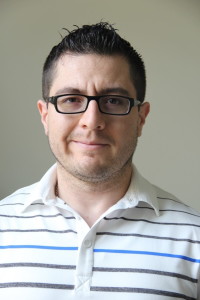By Bobby Martinez/@bmartinez
Writing an award-winning historical paper requires a unique topic and the ability to tell a true story effectively.
No one knows that better than biology senior and history minor Miguel Ramirez.
Ramirez is one of two students who won the Caldwell Memorial Awards for excellence in history for the senior division. History senior Jessica Ceeko placed second in the upper division and Ramirez placed third.
In addition, Ramirez’s paper on the Aztec Eagles in WWII, a Mexican squadron that supported the U.S. and allied forces during World War II, received best undergraduate paper at the 6th Annual Texas A&M University History Conference held in College Station on March 27-28.
The paper, titled “Águilas Aztecas: Mexico’s Forgotten Contribution to World War II,” gives detailed insight into Águilas Aztecas, and the changing relationship between Mexico and the U.S. during the 1940s. Ramirez’s paper tells in specific detail how the Aztec Eagles, a group of 299 men, experienced success and hardship in the effort to free the Philippines and Formosa from Japanese occupation.
Mexico officially declared war against the axis powers on May 22, 1942 after Germany sank two tankers. This would lead to the first collaboration with the United states and creation of Mexico’s 201st squadron, the Aztec Eagles.
Ramirez produced the paper as part of Methods of Historical Research (HIST 4301), a capstone course taught by Dr. Edward Westermann, associate professor of history. Topics have ranged from policymaking in San Antonio’s Edgewood Independent School District to the great flood in San Antonio to other regional topics.

The goal, Westermann explained, is for students at the end of their course of study to select a historical topic, hopefully an interesting and compelling story, that will excite students and further knowledge.
Westermann coaches the whole process along by leading his students to the right sources and historical documentation. “Let’s go see what the sources tell us,” he urges them.
In Ramirez’s case, Westermann military history background allowed him to guide Ramirez to sources he would need. The student’s two-page bibliography spans books, U.S. Department of Defense documents, Office of Air Force History records, and archival news stories.
Because of the nature of the research project, Westermann required the research be done in Spanish and English.
“Not only was he able to get sources that were in both languages, but he was able to get sources from Mexico,” Westermann said.
What made Ramirez’s 18-page paper an award winner, Westermann said, was its uniqueness and his ability to frame the right questions. “The Aztec Eagles was a little-known piece of history and Ramirez was able to tell the story effectively and show the changing relationship between the U.S. government and Mexico,” Westermann explained.
He was also “able to find sources that told what the unit went through, including things like training here in Texas and incidences of prejudice and discrimination,” he added. “But it also tells us about how these communities, in some cases, came together. He not only tells the story about what the unit did, but why it was important.”
All of these qualities, he commented, are what makes successful research papers interesting, readable, and potentially award-winning.
Ramirez says he traces his interest in history back to when he was a child. His brother first introduced him to the story of the Aztec Eagles when he was just five years old when they were growing up in Guadalajara, Mexico.
“It’s a passion and a hobby I had since I was little,” Ramirez said. “We were asked to choose a historical subject, and this topic was the first thing that came to mind,” he added.
Ramirez plans to graduate in the Fall 2015. He is contemplating what he wants to do next. As a biology major, his intentions are to attend medical school, but his passion for history is growing.
Ramirez offers advice for students who wish to enter similar research competitions. Take advantage of professors’ knowledge. Use the library archives. And, “Choose a topic you are really interested in and feel passionate about,” he offered. “The best way is to find good resources.”






